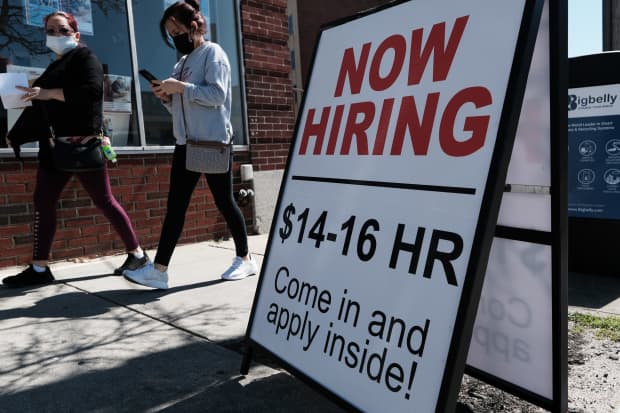This post was originally published on this site

Lots of companies are trying to hire, but not everyone is ready to go back to work.
Getty Images
Once burned twice shy, the saying goes. That sums up the shrunken expectations on how quickly the U.S. will recover 8 million jobs still missing from the pandemic.
Just a few months ago, most economists believed the U.S. would start adding up to one million new jobs a month during the summer as coronavirus cases waned and businesses were allowed to fully reopen.
Then came the disappointing April employment report. The U.S. gained a paltry 266,000 new jobs on a seasonally adjusted basis — well below the 1 million forecast.
Wall Street is not getting ahead if itself this time. Economists polled by Dow Jones and The Wall Street Journal estimate that just over 500,000 new jobs were created in May.
The report will be published next Friday June 4 in a week full of economic signposts, but it’s going to get the lion’s share of attention after the disappointing April figures.
“April was a shock,” acknowledged Robert Frick, corporate economist at Navy Federal Credit Union.
See: MarketWatch Economic Calendar
Economists offer a potpourri of possibilities as to why hiring is not as strong as expected.
One theory is that a lot of older people opted for early retirement instead of trying to ride out the pandemic, especially with the stock market soaring to a record highs. They simply decided to cash out.
A shortage of workers with the necessary skills, particularly in manufacturing and construction, is another problem that existed even before the coronavirus struck.
Read: Computer-chip shortage triggers first drop in durable-goods orders in a year
The pandemic itself has put many people with small children or elderly parents in a bind. They’ve had to stay home to care for family since schools and nursing homes were either closed or operating at reduced capacity.
The latest hunch is that extra unemployment benefits are discouraging people from taking new jobs, especially if they are still worried about the virus or don’t think the pay is high enough. The federal government has added $300 a week on top of the normal state-paid benefits.
Read: Unemployment claims fall to new pandemic low of 406,000 as layoffs wane
“The evidence is becoming clear that some people are pickier in taking a job than they otherwise would have been,” said Gus Faucher, chief economist at PNC Financial Services.
Nearly half of the U.S. states plan to cut off extra federal benefits starting in late June, but it won’t have any bearing on the May employment report.
In any event, companies that desperately need more help aren’t sitting around waiting for workers to come back.
A number of businesses are raising wages to make it worthwhile for people to rejoin the labor force. Pay hikes are especially prevalent in service-oriented jobs at hotels, restaurants, entertainment venues, warehouses and the like.
Read: Why aren’t Americans happier about the economy? They are paying higher prices for almost everything
Faucher thinks the economy is likely to add an average of 600,000 new jobs each month until the end of the year, but he expects more ups and downs that give investors whiplash.
Frick suspects hiring won’t really take off until the fall after schools reopen, public transportation is readily available, and extra federal benefits expire.
Read: U.S. inflation hasn’t been this high since 2008
People who work in lower paid service industries that bore the brunt of the job losses during the pandemic need everything to go right in order to get back to work, he said.
“You have to have child care, you have to have transportation, you have to be near a job,” he said.
And what if employment gains are as surprisingly strong in May as they were weak in April? Don’t overreact. Just average the gains over the two months for a pretty good idea of how much hiring is going on, economists say.
“It still going to be a good year, but we need to accept we don’t know a lot about the future,” Frick said.

